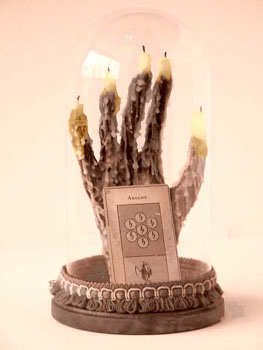 Inv.DD/mg-31754
Inv.DD/mg-31754
Hand of Glory
Of Anglo-Saxon origin, acquired by the Surnateum in London in 1920
Recently restored and installed on a base
The Hand of Glory - a rather worrying amulet - is reputed to make its owner invisible and
paralyse
anyone who looks at the light it emits. Highly prized by thieves and burglars, a
few rare specimens can still be found in museums.
The Surnateum's specimen was acquired in London in the 1920s.
The term 'Hand of Glory' is a translation of the French main de
gloire, derived from the old French mandaglore and
ultimately from the Latin mandragora, meaning 'mandrake', a magical root highly prized by
occultists in centuries past.
The Surnateum's specimen has five candles, one for each digit.
According to tradition, in this case if the thumb candle does not
light, then that means that one of the individuals targeted by the
'spell of fascination' will not be affected and will have the thief
captured. In t his case, the wise burglar cautiously avoids the house
in question. According to legend, anyone wishing to counteract the
Hand of Glory's spell must throw milk on it to extinguish the candles.

Thomas Ingoldsby (1788-1845) wrote the following verse in his
The Ingoldsby Legends:
Wherever that terrible light shall burn,
Vainly the sleeper may toss and turn;
His leaden eyes shall he ne'r unclose
So long as that magical taper glows,
Life and treasure shall he command
Who knoweth the charm of the glorious Hand.
The passage below, written in rhyming verse, is also taken from
The Ingoldsby Legendes (R.H. Barham's version, 1840).
"On the lone bleak moor, At the midnight hour,
Beneath the Gallows Tree,
Hand in Hand, The Murderers stand,
By one, by two, by three,
Now mount who list, And close by the wrist,
Sever me quickly, the Dead Man's fist,
Now climb who dare, Where he swings in air,
And pluck me five locks of the Dead Man's Hair!"
According to the 1826 edition of Collin de Plancy' Dictionnaire
Infernal, a Hand of Glory can be manufactured as follows:
"The Hand of Glory is the hand of a hanged man prepared as
follows: it is wrapped in a piece of funeral pall and squeezed well to
ensure that as much remaining blood as possible is removed. It is then
placed in an earthenware vessel with salt, saltpeter, zimat and long
peppers, all of which have been crushed to a powder. It is left in the
pot for a fortnight, then removed and exposed to the hot sun until it
is completely dry. If the sun is not strong enough, it is placed in a
heated oven with fern and vervain.
Next a a kind of candle is made with the fat from a hanged man,
virgin wax and Lapland sesame . The Hand of Glory is used as a
candlestick to hold this candle when lighted. Wherever one travels
with this baleful instrument, those who are already there will remain
immobile, unable to move as if they were dead."
The Petit Albert adds that the wick must be woven from tufts
of hair from the horse of the hand's owner.
Collin de Plancy adds that since fewer people are hanged now than
previously, it is hard to make such hands these days. He recounts the
following legend:
"Two magicians had plans to steal from an inn. They asked to
spend the night next to the fire, and their wish was granted. When
everyone had gone to bed, the serving wench, who distrusted the
sinister-looking travellers, looked through a hole in the door and saw
what they were up to. She saw them remove a human hand from a bag,
slather the fingers in some kind of ointment and light them all, apart
from one which would not light,
despite their best efforts. As she found out, the reason it did not
light was that she was the only one of all the people in the inn who
could not sleep. Since the other fingers were lit, everyone else was
in a very deep sleep. She tried to rouse her master, but was unable to do so.
In fact, she was unable to waken anyone until she managed to put out
the burning fingers while the two thieves were at work in one of the
bedrooms. Once the candles were extinguished, everyone woke up and the
thieves were chased out of the inn.
Thieves are unable to use the Hand of Glory if one has taken the precaution
of rubbing the doorway with an ointment made from gall from a black
cat, fat from a white hen and blood from an owl. This ointment must be
made during the midsummer heat."
What a smell!
The Surnateum's Hand of Glory can rather easily open the lock on a
safe, but less easily the doors of buildings, at least those in the
Surnateum. Our Museum of Supernatural History is protected by spells
infinitely worse than anything you can imagine. The last time a
dishonest visitor committed a petty theft at the Museum, not only was the object returned to the Surnateum
within two days, but part of the thief's family was decimated. These
kinds of protective measures may explain
why the Hand of Glory does not function properly within the Museum.

